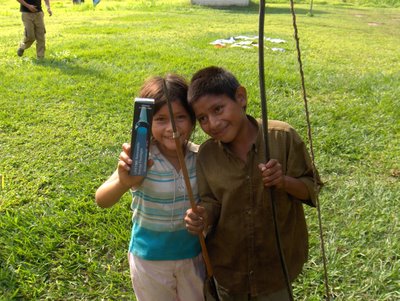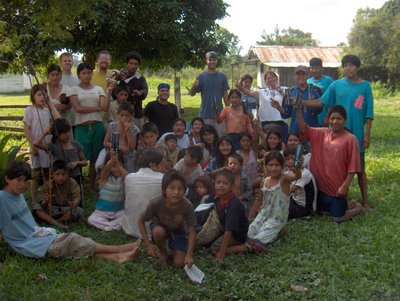 View more photos...
View more photos...We are now two and a half months into the project and things are continuing to progress. Last weekend we spent with the tribe "Los Bia". It was Clayton's last chance to get to the jungle before he left, and even better, the everlasting flashlights finally arrived! We quickly packed up and prepared five more rocket stoves (wood burning) from the CEDESOL foundation, and Ruth managed to get clothes donations for the people as well.
This trip had to be cut short because of Clayton's flight home, so we only were able to spend a day with Los Bia. I'll just quickly explain how exactly we arrive at the location of the community. First we have to take a bus from Cochabamba 4 hours northwest into the Chapare region, the Amazon. Once we arrive in a small town called Chimore, we have to get taxis that take us to the river, which is about an hour. Then at Port San Marcos, which is nothing more than 5 conoes and two thatch houses, we wait for a conoe with an outboard motor to take us about 2 hours downstream. By the time we arrive we hike a path through the jungle for about 15 minutes that leads to the community. Los Bia live amongst scorpians, tarantulas, pumas, tigers, and anacondas, but unfortunately we are yet to even see an alagator.
The donating of clothes and flashlights was a memorable experience for us. We gave one garment of clothing to every woman and child, and some lucky children finally received their first pair of shoes. We didn't have many men's clothes so we promised to return with more donations. We are extremely happy to see how the flashlights help the people. In my opinion Los Bia was perfect location for the new flashlight technology. These people live a day's worth of traveling from anyplace they could buy batteries, and have no electricty. It also is a huge benefit for them because they hunt wild pig at night.
After we passed them out, we all got together and learned how to use them. I think they were a little uncertain that these flashlights without batteries would last a lifetime when I explained it to them. However, we all shook them up and we had light! The relationships and experiences we have had with Los Bia are some of our most memorable, and we hope to continue visiting them until the end of the project.
Back in Cochabamba things are moving a little slow. Sobre la Roca had to move out of the old workshop for a smaller one, our new home just south of downtown. We are planning on distributing 200 cookers in the next two months, so things are definitely going to pick up. Also, we have a woman from National Geographic coming in late August to see what the project is all about. We are extremely excited to have her because she will be working on the book that is publishing our project among others across the world! If you would like to read about the book go to http://www.studentglobe.org/.
